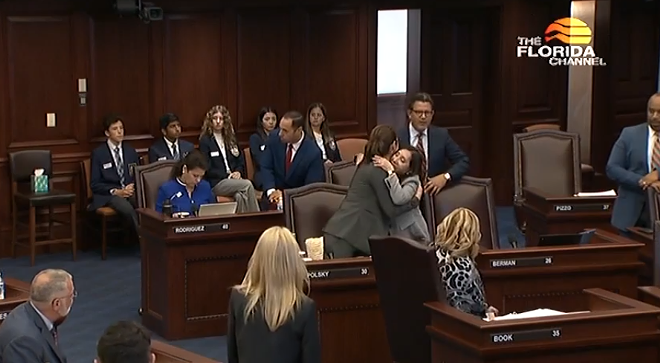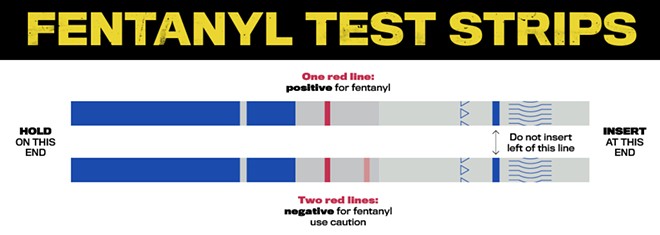The Florida Channel
Florida Sen. Tina Polsky hugging Democratic colleague Sen. Lori Berman after a bill to decriminalize fentanyl testing equipment passes on March 29, 2023.
In a rare, bipartisan show of support, the Florida House of Representatives on Wednesday gave final, unanimous approval to a bill (SB 164) that offers the bare minimum on smart drug policy by decriminalizing fentanyl test strips, following the lead of dozens of states nationwide.
“This is such an important bill, and it may seem like it’s just making sure that people have access to this one little thing, but it is huge,” said Florida Rep. Kelly Skidmore, D-Palm Beach. “And it will save lives. It will absolutely save people.”
Fentanyl test strips are small, inexpensive strips that can test batches of drugs for fentanyl, a powerful opioid that was involved in tens of thousands of U.S. overdose deaths in 2022, and 6,417 deaths in Florida in 2020 alone, according to the Florida Medical Examiner’s Office.
Although the drug is legally prescribed as a powerful painkiller, much of the fentanyl that’s causing death is illicitly manufactured, and therefore unregulated.
Part of the danger is that people who use a drug, including those without any sort of history of substance use disorder, may not always be aware that what they’re taking contains fentanyl.
It’s been laced into pills, as well as powdered drugs such as cocaine and methamphetamine, which have their own risks but are not nearly as deadly in such small amounts.
Without having a tolerance for fentanyl, taking as little as two milligrams of it can be fatal.
“We have also lost so many people to fentanyl overdose who weren’t prior drug users,” said Florida Rep. Christina Hunschofsky, a Democrat who sponsored the House version of the bill.
“They just needed an Adderall, they thought, from a friend — to make it through a final exam, and then they died.”
Fentanyl test strips, while completely harmless by themselves, are currently illegal under Florida law, because the state includes them in its definition of “drug paraphernalia,” which is illegal to possess, sell, or manufacture.
Similar legislation to decriminalize the strips last year failed to pass at the last minute, perhaps due to some critics claiming (without proof) that doing so would incentivize drug use.
But that’s not backed up by research. Studies have found that fentanyl test strips can promote safer behaviors to avoid accidental drug overdose. Health experts say they can be life-saving.
“It will save lives. It will absolutely save people,” said one Florida legislator on the House floor.
tweet this
“Fentanyl test strips don’t make people do drugs,” Rep. Hunschofksy shared emphatically on Wednesday. “They don’t stop people from doing drugs,” she added. “They stop people from dying, and that’s the goal.”
The Florida Senate already approved the bill in March, meaning this week’s House vote sends it to Florida Gov. Ron DeSantis to sign into law.
Compared to decriminalization legislation passed in some other states, however, Florida’s is more conservative.
Rather than decriminalizing all drug testing equipment, as other states have done, Florida’s bill specifically excludes from its definition of drug paraphernalia “narcotic-testing drug products” that are solely capable of detecting fentanyl.
An amendment filed to the bill in March, and later adopted, even further narrowed its scope, specifying that the bill would only decriminalize fentanyl-testing equipment provided it is not capable of testing the potency, weight or quantity of the drug — which fentanyl test strips are not capable of anyway.
But this isn’t unique to Florida. Decriminalization laws in Alabama, Arizona, Delaware, Louisiana, Minnesota, New Jersey and Wisconsin, have also decriminalized only fentanyl test strips, according to the Network of Public Health Law.
So, Florida’s is a watered-down version of legislation (without such a specification) that has passed in at least 22 other states.
Meanwhile, two Republican-sponsored bills similarly approved by Florida legislators this year (albeit, without unanimous approval) take a tough-on-crime approach toward addressing the overdose crisis.
One bill, already signed into law by DeSantis, imposes a three-year prison sentence minimum on those who sell, traffic or manufacture fentanyl and fentanyl analogs.
Another bill, on its way to DeSantis, would make it easier for prosecutors to indict people for murder or attempted murder if they give someone fentanyl that leads to an overdose.
Drug policy advocates have warned against this “tough on crime” approach, arguing that it will only exacerbate the country’s failed war on drugs, without sufficiently addressing underlying causes of drug misuse or making it easier for people who do have a problem to get help.
“Every time we treat drugs as a law enforcement problem and push stricter laws, we find that we punish people in ways that destroy their lives and make it harder for them to recover later on,” Adam Wandt, an assistant professor of public policy at John Jay College of Criminal Justice in New York, told the Associated Press in March.
Fentanyl test strips aren’t the end-all, be-all solution to the overdose crisis.
While their use is endorsed by the Biden administration, as well as the American Medical Association and agencies like the National Institute on Drug Abuse, they’re broadly considered just one tool in the overdose prevention toolbox.
Other strategies include ensuring easy access to affordable, evidence-based treatment for substance use, as well as addressing social determinants of health that can contribute to overdose risk, such as poverty, homelessness (especially among veterans) and incarceration.
In 2021, a staggering 94% of people with a substance use disorder in the U.S. did not receive any treatment, according to the U.S. Department of Health and Human Services.
Florida, for its part, has moved to expand access to substance use and recovery services, as well as access to naloxone, a drug that can reverse an opioid overdose.
While Florida’s ban on the use of fentanyl test strips was already believed to be rarely enforced, decriminalizing them could help organizations secure grants to buy them for distribution, and help to promote their use.
“We mark the loved ones that we’ve lost to the opioid crisis,” said Florida Rep. Anna Eskamani, D-Orlando. “And the ability to test is so important, and to make sure people aren’t criminalized for that.”


